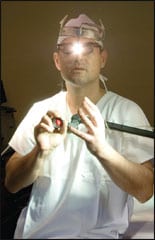By Jeffrey S. Epstein, MD
As surgeons, we spend years mastering our technique and skills. But all too often, these are not enough to increase booking rates for surgeries. Every surgeon is unique, and as such, we all need to find a consultation system that feels right. Several strategies have proven effective in a variety of different practices.
The 10 commandments of a winning doctor-patient consultation include:
1) Thou shalt prepare before entering the consultation room. Look over the patient’s chart and allow your patient adviser (PA) to tell you about the patient, including their goals, fears, referral source, and whatever else may be useful.
2) Thou shalt warmly greet the patient, extending your hand and making eye contact. Make small talk, even if just for a minute or two. Discuss family, hobbies, a referring surgeon, the city where the patient lives, or anything that will ease the mood.
3) Thou shalt apologize for any delays in being seen.
4) Thou shalt ask questions. Say something like, “So Dan, your patient adviser, has told me that for the past several years, you have been bothered by …” Listen while the patient speaks, and acknowledge what was said by saying, “So I understand that you are seeking …” Upon concluding your consult, ask once more if
anyone has questions.
5) Thou shalt be clear about what is recommended and why, presenting alternatives/options as appropriate.
|
Revealed: Three Secrets of Seriously Successful Surgeons |
|
Do you want to know what the nation’s top-grossing plastic surgeons discuss when they get together? We can’t tell you everything, of course, but several overarching themes emerged during the YellowTelescope Mini Think Tank at the 2013 Vegas Cosmetic Surgery meeting. The three habits of seriously successful surgeons are: 1) Surround yourself with extremely talented people to achieve excellence. 2) Focus your spending on profit centers such as web, sales staff, and customer relationship management software, not on cost centers such as accounting, décor, and overpriced medical supplies. 3) Create a true exit strategy. It can make you millions, sometimes tens of millions. Without one, your practice ends up worth very little. —Jon Hoffenberg |
6) Thou shalt use thy mouth before thy hands. After asking for permission, use your hands to not only examine the patient but also to demonstrate how the surgery will be performed.
7) Thou shalt convey confidence not cockiness, and humility not incompetence.
8) Thou must look the part. Appearances are important. Avoid stained or rumpled lab coats, unkempt
| Read past articles by Jeffrey S. Epstein, MD, FACS |
hair, or blood on your scrubs.
9) Thou shalt remember one of the golden rules: If you don’t have anything nice to say about someone (including another surgeon, who perhaps did prior work on the patient), don’t say anything at all.
10) Thou shalt conclude the consultation by letting the patient know that the PA will provide information on fees, and will be able to schedule the procedure. Finally, offer your availability for questions, a second consult, or email communication.
 |
Jeffrey S. Epstein, MD, FACS, is the director of the Foundation for Hair Restoration, and maintains full-time offices in Miami and New York City. He is the co-founder of YellowTelescope Inc, with Jon Hoffenberg. He can be reached at [email protected]. |






